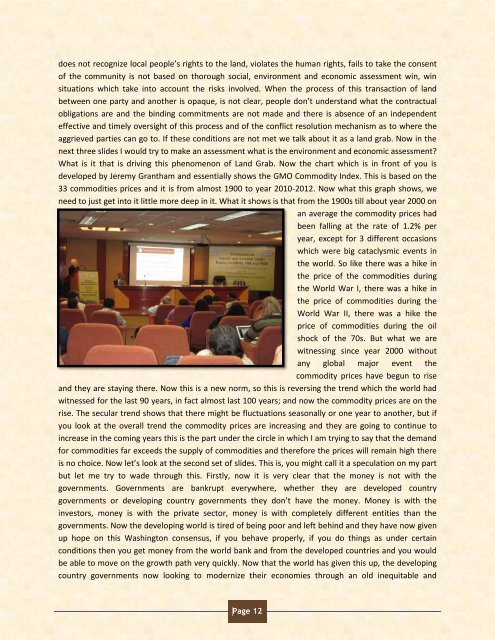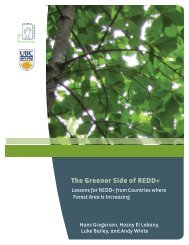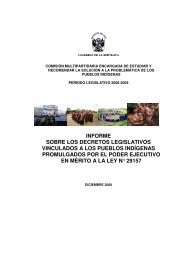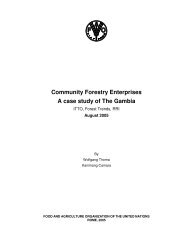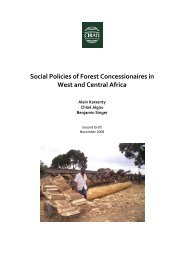Concept Note - Rights and Resources Initiative
Concept Note - Rights and Resources Initiative
Concept Note - Rights and Resources Initiative
Create successful ePaper yourself
Turn your PDF publications into a flip-book with our unique Google optimized e-Paper software.
does not recognize local people’s rights to the l<strong>and</strong>, violates the human rights, fails to take the consent<br />
of the community is not based on thorough social, environment <strong>and</strong> economic assessment win, win<br />
situations which take into account the risks involved. When the process of this transaction of l<strong>and</strong><br />
between one party <strong>and</strong> another is opaque, is not clear, people don’t underst<strong>and</strong> what the contractual<br />
obligations are <strong>and</strong> the binding commitments are not made <strong>and</strong> there is absence of an independent<br />
effective <strong>and</strong> timely oversight of this process <strong>and</strong> of the conflict resolution mechanism as to where the<br />
aggrieved parties can go to. If these conditions are not met we talk about it as a l<strong>and</strong> grab. Now in the<br />
next three slides I would try to make an assessment what is the environment <strong>and</strong> economic assessment<br />
What is it that is driving this phenomenon of L<strong>and</strong> Grab. Now the chart which is in front of you is<br />
developed by Jeremy Grantham <strong>and</strong> essentially shows the GMO Commodity Index. This is based on the<br />
33 commodities prices <strong>and</strong> it is from almost 1900 to year 2010-2012. Now what this graph shows, we<br />
need to just get into it little more deep in it. What it shows is that from the 1900s till about year 2000 on<br />
an average the commodity prices had<br />
been falling at the rate of 1.2% per<br />
year, except for 3 different occasions<br />
which were big cataclysmic events in<br />
the world. So like there was a hike in<br />
the price of the commodities during<br />
the World War I, there was a hike in<br />
the price of commodities during the<br />
World War II, there was a hike the<br />
price of commodities during the oil<br />
shock of the 70s. But what we are<br />
witnessing since year 2000 without<br />
any global major event the<br />
commodity prices have begun to rise<br />
<strong>and</strong> they are staying there. Now this is a new norm, so this is reversing the trend which the world had<br />
witnessed for the last 90 years, in fact almost last 100 years; <strong>and</strong> now the commodity prices are on the<br />
rise. The secular trend shows that there might be fluctuations seasonally or one year to another, but if<br />
you look at the overall trend the commodity prices are increasing <strong>and</strong> they are going to continue to<br />
increase in the coming years this is the part under the circle in which I am trying to say that the dem<strong>and</strong><br />
for commodities far exceeds the supply of commodities <strong>and</strong> therefore the prices will remain high there<br />
is no choice. Now let’s look at the second set of slides. This is, you might call it a speculation on my part<br />
but let me try to wade through this. Firstly, now it is very clear that the money is not with the<br />
governments. Governments are bankrupt everywhere, whether they are developed country<br />
governments or developing country governments they don’t have the money. Money is with the<br />
investors, money is with the private sector, money is with completely different entities than the<br />
governments. Now the developing world is tired of being poor <strong>and</strong> left behind <strong>and</strong> they have now given<br />
up hope on this Washington consensus, if you behave properly, if you do things as under certain<br />
conditions then you get money from the world bank <strong>and</strong> from the developed countries <strong>and</strong> you would<br />
be able to move on the growth path very quickly. Now that the world has given this up, the developing<br />
country governments now looking to modernize their economies through an old inequitable <strong>and</strong><br />
Page 12


